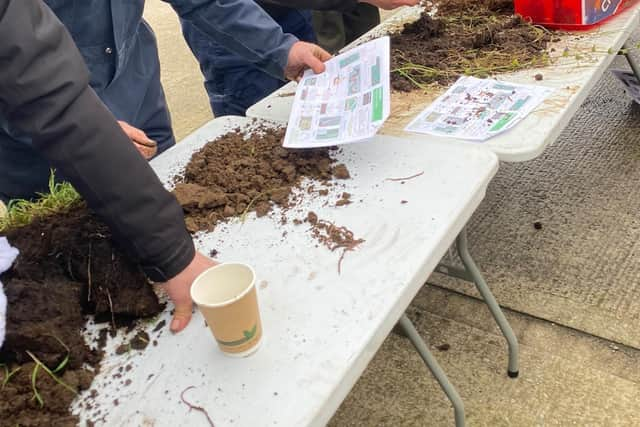Beacon farm workshops highlight the importance of soil health
and live on Freeview channel 276
Charlie Morgan, a grassland consultant from Wales with many years’ experience in the industry, having previously worked for IBERS, led the workshops on the day. Charlie stressed the importance of healthy functioning soil on farm. Previously poor soil health and the resulting impact on grass swards could be masked by the application of fertiliser but with the recent price rises and poor supply, working to optimise soil health and fertility will be essential.
The first step in understanding soil conditions on farm is to soil sample. A pH of 6.2 to 6.5 is optimal, with lime applications required for fields with a lower pH. Whilst lime may seem an expensive application at the time, it is a wise investment when considering the impact of pH on fertiliser utilisation and resulting DM production.
Advertisement
Advertisement
Whilst soil sampling is useful for improving soil chemistry, it can often lead to a heavy emphasis on the chemical aspects of soil. Physical and biological aspects of soil can often be forgotten. When sent for testing, soil is dried and milled, meaning pH, P, K and Mg levels can be correct, but physical and biological factors could be holding it back. For example compaction can prevent the penetration of plant roots, prevent the uptake of fertilisers and cause waterlogging – all of which can significantly affect Dry Matter production.


Another means for understanding soils on farm and the variability between and within fields is through the use of a spade. Each participant was asked to bring a soil plug from their own farm along on the day with Charlie demonstrating how to visually check for indicators of poor sward performance, compaction, pests, organic matter and fungi. Checking for the presence of Earthworms within the soil plug was also shown as an easy way to check for biological health of the soil due to the vital role they play in the circulation of nutrients. Getting to know the chemical, physical and biological characteristics of soils on farm is the first step to improving soil health and fertility, and support optimal grassland and crop production .